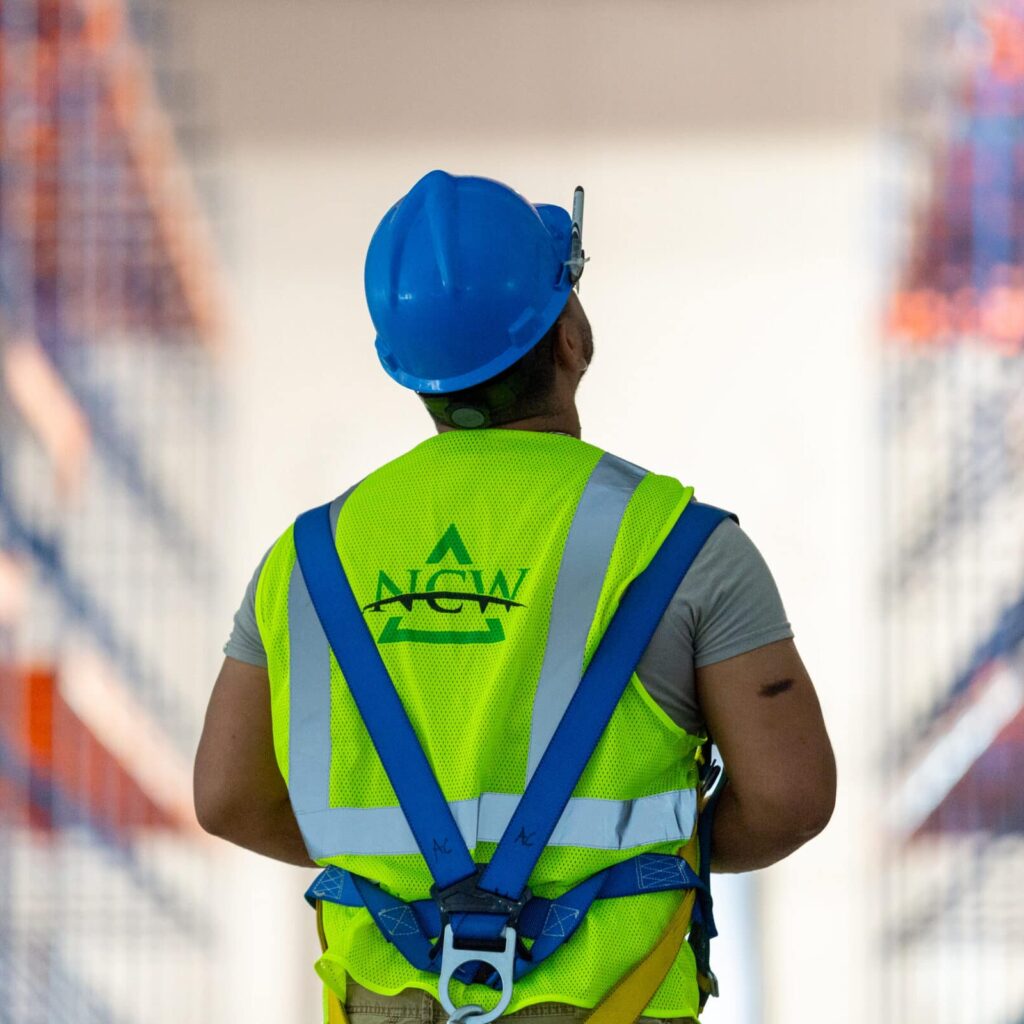Project Engineer Construction
Check out what a project engineer in construction typically does and see what opportunities the NCW team has for you! Plus, find out how to land the job with our free interview packet.
UNLOCK OUR FREE INTERVIEW PACKET

Get the edge you need to ace your next interview directly from the source.
Download Our Free Interview Packet!
What’s Inside?
Discover our comprehensive interview guide packed with valuable tips and insights to help you navigate every stage of the interview process with confidence. From dressing for success to mastering phone and video interviews, negotiating job offers/salary, and handling resignations, our guide covers it all. Download our interview guide and unlock the secrets to interview success in one convenient package.
SNEAK PEEK
Project Engineer Construction
From residential buildings to public infrastructure projects and everything in between, the construction industry plays an essential role in shaping the world around us. Within this bustling industry, construction project engineers are important individuals who are integral to the successful planning and execution of various construction projects.
A construction project engineer career generally involves overseeing and coordinating various aspects of construction projects. The individuals are generally responsible for ensuring that projects are completed on time, within the original scope of the budget, and according to quality and industry standards. Construction project engineers will work closely with architects, contractors, subcontractors, and other relevant project stakeholders to effectively plan, organize, and manage the construction process.
The requirements to become a construction project engineer are not as stringent as one might imagine. In most cases, requirements include a bachelor’s degree in civil engineering, construction management, or a related field. Some employers may also prefer candidates with a master’s degree or relevant work experience beyond an undergraduate degree. Additionally, acquiring professional certifications like the Project Management Professional (PMP) certification, for instance, can drastically enhance an applicant’s credentials and employment prospects in this industry.
Construction project management for engineers involves a multitude of varying responsibilities. Project engineers typically collaborate with architects and design teams to review plans, identify potential obstacles or challenges, and propose solutions. They estimate project costs, prepare detailed budgets, and develop schedules for all teams involved to ensure smooth progress throughout the construction progress.
A construction industry project engineer will also coordinate with contractors, subcontractors, and suppliers, overseeing procurement activities and managing contracts. They also monitor construction project progress, conduct inspections when necessary, and ensure compliance with safety and building codes, as well as municipal regulations.
In the construction industry, project engineers play a crucial role in bridging the gap between design and construction. Project engineers act as effective communicators who facilitate collaborative efforts among several multidisciplinary teams. Their technical expertise allows them to evaluate construction methods, materials, and systems, so they can make better-informed decisions to help optimize project outcomes. Project engineers also address any issues that may arise during construction, resolving conflicts and implementing changes as needed.
Table of Contents
Construction Project Engineer Requirements
During hiring phases or recruitment initiatives, employers seeking candidates for construction project engineer positions typically seek candidates with a specific set of skills, experience, and relevant qualifications. Meeting these construction project engineer requirements is important for job seekers to showcase their abilities and provide evidence that they can handle the responsibilities and effectively carry out the duties necessitated by the role.
A project engineer construction job description can entail a broad range of responsibilities and requirements. Employers expect project engineers to oversee project planning, budgeting, scheduling, as well as resource allocation. Qualified applicants should be capable of managing construction contracts, coordinating with stakeholders, and ensuring compliance with safety regulations and building codes. Project engineers may also need to have the skills to help resolve technical issues, quality control inspections, and provide regular project status updates along the way.
To succeed in this role, project engineers must possess a combination of managerial, technical, and interpersonal skills. Project engineer construction skills relevant to construction project engineering might include a foundational understanding of basic engineering principles, construction techniques, and materials. Proficiency in computer-aided design software, project management software, and other industry-specific digital tools is also highly advantageous.
Prospective project engineers should also be able to demonstrate excellent organizational and managerial skills. These individuals need to effectively coordinate with teams, manage available resources, and track project progress. Other construction project engineer duties may include having great attention to detail, problem-solving competency, and critical thinking skills – all of which are important for identifying and resolving issues that arise throughout the construction process.
Employers also seek broader project engineer construction qualifications like a bachelor’s, associate’s, or master’s degree in a relevant field. Some organizations may prefer candidates with additional professional certifications in project management or construction engineering as well. And in some cases, relevant work experience is the most important consideration for employers seeking to fill open positions. And while the list of project engineer responsibilities is lengthy, there are numerous ways for candidates to highlight their skills and expertise to stand out among other qualified applicants.
Project Engineer Construction Management
Project engineer construction management entails the coordination and management of construction projects from start to finish. Because project engineers are collaborating with architects, contractors, and other stakeholders to ensure effective communication, project engineers are responsible for facilitating the flow of information, resolving conflicts, and making difficult decisions in order to keep the project on track and within the budget.
One of the most important responsibilities of project engineers relates to project engineer coordination in construction. They coordinate with different teams and personnel to ensure smooth operations and efficient utilization of resources throughout the course of the project. By facilitating greater collaboration, project engineers can foster a cohesive working environment while aligning multiple efforts to achieve a number of project goals.
Project engineer construction documentation is another essential duty. Project engineers must maintain accurate and up-to-date project documentation, including plans, specifications, contracts, and progress reports. This documentation helps provide stakeholders with information about how the project is progressing and supports effective decision-making throughout the project lifecycle.
Construction project engineering planning is also an integral aspect of the project engineer’s primary duties. These individuals contribute to project planning by providing technical insights, evaluating construction methods, and estimating costs and timelines. Project engineers also create project schedules, establish work sequences, and monitor progress against target milestones.
Project engineer construction safety is another major part of daily job duties. Project engineers are tasked with enforcing safety regulations and ensuring compliance with building codes to protect workers as well as the integrity of the project engineer construction projects. Project engineers will also conduct regular safety inspections, identify potential safety hazards, and implement corrective measures to mitigate risks and maintain a safe and efficient working environment.
Project Engineering Regulations
Compliance with building codes and regulations is paramount to the construction industry. These codes and regulations ensure that construction projects meet safety, structural, and environmental standards, and project engineers are a crucial component in ensuring regulatory adherence and upholding project engineering regulations and standards.
Building codes for construction projects are typically established by regulatory authorities to safeguard the health, safety, and general welfare of the public. These codes provide guidelines regarding structural integrity, fire safety, electrical systems, plumbing, accessibility, and other important features of buildings. Compliance with these codes is essential to ensure that the constructed facilities meet the required standards for operation.
Project engineers are largely responsible for understanding and implementing project engineering regulations. As such, engineers must stay updated on the latest building codes, zoning laws, and other relevant regulations that are applicable to their future or ongoing projects. By familiarizing themselves with these regulations, project engineers can incorporate them into the project design and construction process.
Construction regulations for project engineers involve not only adherence to building codes but also compliance with other regulatory requirements. Project engineer construction regulations can include environmental regulations, permitting processes, occupational health and safety standards, as well as contractual obligations.
By upholding project engineering regulations, project engineers contribute to the overall safety and integrity of their construction projects. They help by minimizing risks, preventing accidents, and promoting the well-being of workers, occupants, and the surrounding environments. Compliance with local and industry regulations also safeguards against potential legal and financial liabilities, ensuring that projects are completed successfully and meet the required quality and safety standards.


We’re Hiring!
We Think You Have What It Takes To Be A Project Engineer… Do You?
As an integral piece of several industries, forklift operators are needed by top general contractors nationwide. NCW partners with top ENR contractors to help fill their open roles. Thinking about making the next jump in your career? Talk to the NCW team today!
Construction Project Engineer Salary
The expected salary range for construction project engineers can vary significantly based on a handful of factors including experience, education, location, industry, and the size and complexity of projects they manage.
The average salary of construction project engineer positions varies by country and region. According to data from the U.S. Bureau of Labor Statistics, the median annual wage for construction project managers, which would include project engineers, was $98,890 in May 2021. However, it’s important to keep in mind that this figure represents a broader category of construction project managers and may not reflect some of the intricacies affecting the range of salaries for project engineers.
Factors that influence project engineer construction salary may include:
While average and median salary figures can provide a general idea, job seekers must research salary ranges specific to their location and industry in order to cultivate a more accurate understanding of reasonable salary expectations.
Find Your Dream Job
About NCW

Stay In Touch
Jumpstart Your Career With NCW
Are you on the hunt for your next career move? Look no further than NCW, the staffing and professional recruitment specialists who do things differently. Since our founding in 2000, our primary focus has been on you – the talented individuals behind each role.
At NCW, we believe in forming meaningful, long-term partnerships with top companies and organizations. We go beyond just matching job requirements and resumes; we want to understand your “whys” and motivations. We’re committed to unraveling the unique qualities and aspirations that drive you, to ensure we find the perfect fit for your skills and ambitions.
Discover the difference of working with NCW. Partner with us and unlock a world of career possibilities. Your next exciting opportunity awaits.
